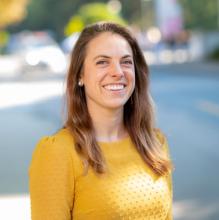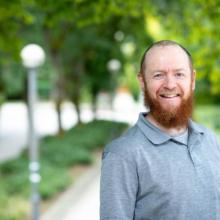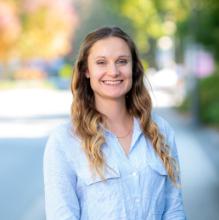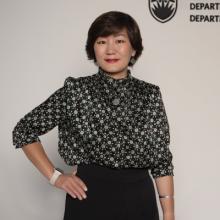Being a Public Scholar means working to bridge the gaps by building meaningful partnerships with communities outside of the university and outside of the computer engineering industry, helping to bring a more diverse set of perspectives into focus in my discipline, centring my research around community needs and priorities and sharing my research with a wider audience.
Research Description
The environmental and social costs of producing and disposing of electronics is a serious global problem, with concerning impacts on human health in developing countries, on the environment and on carbon emissions. Electronic products, and consequently e-waste, contain various toxic elements and pollutants, which pose a major threat to both ecosystems and to human health when discarded. Manufacturing these devices is also highly carbon intensive, with the embedded carbon of electronics often accounting for the majority of their total carbon footprint. In computer engineering, problems are typically only viewed through a technical lens, and only addressed using technical solutions, but this is a socio-technical problem, involving technical design, economic models of production and consumption, consumer behaviors and policy. To address growing environmental and ethical problems in computer engineering, we need to take a holistic approach, developing a richer understanding of the broader social context to inform technical solutions and bringing technical expertise into community collaborations, education and policy work. My research investigates how consumer behaviors and attitudes can inform the design of more sustainable, repairable electronics, how sustainability literacy (specifically around the environmental impacts of computing) and practical computer skills can be advanced through community engagement and education and how to develop sustainable alternatives to existing models of personal electronic design and consumption. A key part of my research involves community-based education. Firstly, through workshops and short-term courses, I’d like to help the broader community develop the computer literacy and technical skills required to engage in electronic repair and to better understand and articulate related concerns and needs. Secondly, I want to develop strategies for bringing community perspectives and meaningful sustainability education into the university-level electrical and computer engineering curriculum. Thirdly, through partnership and consultation with community members and groups, my work investigates the challenges and concerns of diverse groups when using personal electronics and engaging in maintenance and repair activities, in order to develop technical guidelines and policy recommendations.
What does being a Public Scholar mean to you?
In Electrical and Computer Engineering, research is often done in partnership with industry, but it can feel much more disconnected from end users and from the broader community of people who are affected by it but rarely consulted. To me, being a Public Scholar means working to bridge that gap by building meaningful partnerships with communities outside of the university and outside of the computer engineering industry, helping to bring a more diverse set of perspectives into focus in my discipline, centreing my research around community needs and priorities and sharing my research with a wider audience.
In what ways do you think the PhD experience can be re-imagined with the Public Scholars Initiative?
The typical PhD experience is a great opportunity to build skills and contribute to academic research. Through the PSI, I think it can be reimagined to make the outcomes of PhD research more meaningful for a wider community, and to ensure that beyond publications or a PhD thesis, students have the opportunity to pursue research that has a concrete social impact. I think the Public Scholars Initiative also helps students to promote and legitimize more interdisciplinary research, and research that prioritizes the public good over traditional academic metrics for success.
How do you envision connecting your PhD work with broader career possibilities?
I think that the computing industry is increasingly faced with complex environmental and ethical problems (dealing with the effects of climate change and the social implications of machine learning, for example) which require not only technical knowledge but also a broader understanding of social context. My background is very technical, but through my PhD work, I have had the opportunity to work with local communities, develop my teaching skills and engage in much more interdisciplinary research, which has given me a much broader perspective and range of skills. Whether I’m working in education, industry, research or community organizations, after graduation I would like to continue to address problems in computer engineering in ways that consider diverse viewpoints and meaningfully centre the conversation around sustainability and the public good.
How does your research engage with the larger community and social partners?
An important aspect of my research is centered around education. My view is that the broader community should have more insight into computing and that computer engineering students should have more insight into how their work impacts their community and the environment. To this end, I am organizing courses and workshops for undergraduate students, highschool students and the broader community that bring the community and electrical and computer engineers together into conversations around computing and sustainability. I am working on this in collaboration with existing organizations inside and outside of UBC, including SPEC BC, the UBC Learning Exchange and Geering Up. I’m also conducting interviews and focus groups with various stakeholders and members of the broader community to better understand their perspectives and to help to bring these perspectives into policy and technical design guidelines.
Why did you decide to pursue a graduate degree?
My motivations have changed a little throughout my time in graduate school, but I have always valued the opportunity to think carefully about the engineering problems that I am interested in in a self directed way. I also really appreciate the opportunity to work with and learn from great researchers and teachers. As my research has taken shape, I've increasingly come to appreciate the flexibility that a graduate degree offers in allowing me to focus on research that I really care about even when it is not necessarily closely aligned with typical industry priorities.
Why did you choose to come to British Columbia and study at UBC?
Firstly, UBC has a great selection of classes and world class faculty who are engaged in interesting research in engineering, sustainability and education. I feel particularly appreciative and lucky to have had the opportunity to work with both my current supervisor (Dr. Sathish Gopalakrishnan) and previous master's supervisor (Dr. Steve Wilton). Beyond traditional research and coursework, UBC initiatives like the PSI, the UBC Learning Exchange and the Centre for Teaching and Learning (and more) also give students the opportunity to develop wider networks and learn from the broader community. Lastly, visiting the beautiful UBC campus and the surrounding beaches and forests definitely helped me to make my decision.





